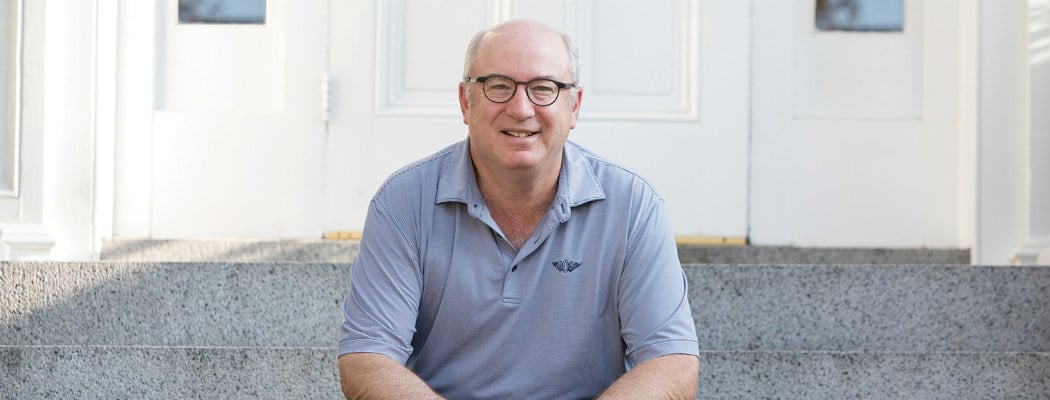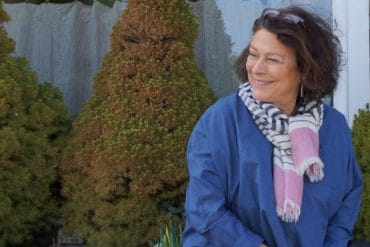A conversation with Massachusetts General Hospital’s president Peter Slavin.
Dr. Peter L. Slavin has served as president of Massachusetts General Hospital (MGH) since 2003 and has helped lead the institution toward being consistently ranked among the top hospitals in the United States. MGH is the third oldest hospital in America, and with 26,000 employees, is the largest private employer in the city of Boston. With the largest research program of any hospital in the United States and as the first teaching hospital affiliated with Harvard Medical School, MGH is now becoming an important force in the creation of new drugs and treatments that promise to accelerate the rate of change in medical delivery over the coming decade. N Magazine sat down with Slavin to discuss a wide range of topics in the medical world.
 N MAGAZINE: Could you explain how the relationship started between Massachusetts General Hospital and the Nantucket Cottage Hospital?
N MAGAZINE: Could you explain how the relationship started between Massachusetts General Hospital and the Nantucket Cottage Hospital?
DR. SLAVIN: Mass General had a long-standing clinical relationship with Nantucket Cottage Hospital. There was a lot of back and forth with patients over the years, and a strong preference here on the island for Mass General among the academic medical centers. Nantucket was very interested in joining a larger organization. We entered into discussions with them. At the same time, we entered into discussions with Martha’s Vineyard Hospital. The result was that both became subsidiaries of Mass General.
N MAGAZINE: Mass General has other satellite locations, but Nantucket Cottage Hospital is on a whole different level, given the geographic isolation realities. What are the biggest challenges dealing with an island thirty miles out to sea?
DR. SLAVIN: One of the challenges is the variability of the patient population on the island year-round. The second is that for hospitals closer to us on the mainland, it’s easier for our doctors to provide services on-site. On Nantucket, given the small patient population and the degree of difficulty in getting here, we rely more on telemedicine than we do in some of the other relationships that we have.
N MAGAZINE: How has telemedicine evolved?
 DR. SLAVIN: It started on Nantucket with a focus on stroke patients. If a patient showed up to the emergency room on the island with symptoms of a stroke, they would be connected electronically through a video link to one of our stroke neurologists who could advise the doctors here on how best to treat the patient and if necessary how to get them up to Boston for interventional care that has been shown to be effective. Telemedicine is now a mainstay and has expanded to many other areas. It’s an important link between this hospital and Mass General.
DR. SLAVIN: It started on Nantucket with a focus on stroke patients. If a patient showed up to the emergency room on the island with symptoms of a stroke, they would be connected electronically through a video link to one of our stroke neurologists who could advise the doctors here on how best to treat the patient and if necessary how to get them up to Boston for interventional care that has been shown to be effective. Telemedicine is now a mainstay and has expanded to many other areas. It’s an important link between this hospital and Mass General.
N MAGAZINE: You have a large cross-section of the population in Boston that present all sorts of different medical needs. Does Nantucket’s population mirror those needs, or does it have unique medical needs?
DR. SLAVIN: I think you have unique medical needs here. Number one is the variation of the population during the course of the year. Number two, clearly there are higher instances of [the tick-borne diseases] Lyme disease and Babesiosis than we see in the Boston area. Apart from that, there aren’t any major differences.
N MAGAZINE: You’re in the business of making people as healthy as possible, but you’re also in a business. If everyone were healthy and didn’t need Mass General or any hospital, it would be a business problem. Is there an inherent conflict in the hospital model?
DR. SLAVIN: We’re a nonprofit organization. Our mission is to improve health. So the greatest measure of our success would be if we could go out of business because everybody was healthy. We’re not in business. We don’t operate to make a margin like for-profit businesses. We’re there to advance our mission and we deal with whatever the economic consequences may be.
N MAGAZINE: With technology now advancing at an incredibly rapid rate, what do you see as the biggest advances in the next decade?
DR. SLAVIN: I group them in two categories. One is biologic advances; the other is digital advances. In biology, perhaps the most exciting area is our ability to harness the immune system to fight cancer and—in the not too distant future—other diseases. Cancers that were deadly just a few years ago are now curable. It’s miraculous. I think there are many more examples of that to come. Digitally, I think we’re at the early stages of the use of information technology to make health care better, safer and accessible. We talked about telemedicine, which is part of it, but so is artificial intelligence and machine learning. It will have a profound impact on people’s care and people’s health.
 N MAGAZINE: What were your impressions of the new Nantucket Cottage Hospital?
N MAGAZINE: What were your impressions of the new Nantucket Cottage Hospital?
DR. SLAVIN: The Nantucket Cottage Hospital is magnificent. I really applaud the leadership here for designing the building and for raising the money to make that building a possibility. It’s really a state-of-the-art facility that’s nicely tailored to the needs of the people of this island and also built in a way that’s flexible so that it can be as efficient as possible.
N MAGAZINE: It used to be that people would come to Nantucket Cottage Hospital as a provider of last resort. We now have a facility that is vastly more sophisticated than we had before. Could you see this hospital having certain functions where people actually choose to have certain procedures here versus off-island?
DR. SLAVIN: The hope is that with this new building, more island residents and visitors will stay here on the island for in-patient and outpatient medical care. Right now, it’s a small minority of them that choose to do so. The staff at Nantucket Cottage Hospital is terrific, and now they finally have a facility to use to the benefit of the patients here. We hope that there will be more elective surgery and less off-island transfers as a result of this state-of-the-art facility.
N MAGAZINE: We hear a lot about the connection between Mass General and Nantucket Cottage Hospital. If you are a Nantucketer, are you in effect getting Mass General quality treatment?
DR. SLAVIN: You are. We work with the doctors here and in some cases we help with recruitment. In some cases it’s our doctors who provide services here. But if you need care that can’t be delivered on the island, we bend over backwards to try and make that possible at Mass General. We have no shortage of patients at Mass General, but when we get a call from Nantucket, it is a very high priority for us to accommodate that patient.
 N MAGAZINE: Do specialists who come here from Mass General enjoy coming to the island?
N MAGAZINE: Do specialists who come here from Mass General enjoy coming to the island?
DR. SLAVIN: I think they particularly enjoy it in the summer months. But I think they enjoy practicing in something other than an academic medical center. It’s a wonderful experience that contrasts with what they experience in Boston.
N MAGAZINE: What is the benefit of Mass General being affiliated with the Nantucket Cottage Hospital?
DR. SLAVIN: Our mission is to improve health, so improving the health of the people of Nantucket is something that is important to us. We do benefit from the referrals that come our way from patients who are in need of secondary, or tertiary, or quaternary care.
N MAGAZINE: If there is a pervasive health issue here, it’s Lyme disease. How big of a priority is Lyme disease for Mass General and could you see a larger focus on Nantucket to find a cure or a vaccine?
DR. SLAVIN: There is great expertise here on Nantucket. Dr. Timothy Lepore, for example, is incredibly knowledgeable about the diagnosis and treatment of Lyme and other tick-borne illnesses. At Mass General, we have Dr. Allen Steere, who discovered Lyme disease when he was at Yale. We certainly see some of the more advanced cases that require specialized care. So my understanding is that there’s already a fair amount of collaboration clinically and academically.
 N MAGAZINE: Mass General is certainly not immune to the political shifts in this country. Obamacare itself was a sea change and that is now evolving. Where does the hospital stand in terms of health insurance and how is that influencing your bottom line?
N MAGAZINE: Mass General is certainly not immune to the political shifts in this country. Obamacare itself was a sea change and that is now evolving. Where does the hospital stand in terms of health insurance and how is that influencing your bottom line?
DR. SLAVIN: I think all hospitals in this country are in favor of expanding health insurance to all Americans. We strongly support that idea. How you go about doing that, I think, is subject to debate. Where we are today, continuing to fine-tune and expand the Affordable Care Act, is certainly one approach. And other approaches have been discussed by a number of the Democratic candidates for president, which would be to expand Medicare to people under the age of sixty-five. I think you get there both ways, although one might be more politically expedient than the other. But expanding access is something we care deeply about.
 N MAGAZINE: How does an institution as large as Mass General stay nimble when every four or eight years there could be major changes in health insurance?
N MAGAZINE: How does an institution as large as Mass General stay nimble when every four or eight years there could be major changes in health insurance?
DR. SLAVIN: We benefit from the fact that we’re in the state of Massachusetts, which is also deeply committed to access to health care for its citizens. Massachusetts buffers us from some of the national changing political winds that are out there. After all, it was Massachusetts’ health reform that gave rise to the national Affordable Care Act. If, God forbid, the Affordable Care Act were to come down in the future, I’m sure Massachusetts would do its best to intervene and pick up the pieces.
N MAGAZINE: U.S. News and World Report recently ranked Mass General as the number two hospital in the country. How important are these rankings?
DR. SLAVIN: First of all, we don’t believe our competition is Mayo Clinic, Johns Hopkins, Cleveland Clinic or the Brigham and Women’s Hospital. We feel honored to be mentioned in the same sentence as those other great institutions. Our competition is mental illness, Lyme disease, heart disease and cancer. Those are the enemies that our staff wakes up every morning to fight. But I think it was a nice shot in the arm for our staff to see our rankings go up from number four to two in this past year.
N MAGAZINE: Can you give us a couple of tangible successes that Mass General has had in delivering life-altering treatments?
DR. SLAVIN: Probably the thing we’re most known for happened in 1846 when we first used ether to put someone asleep during surgery. That transformed surgery in the country and around the world. But more recently, we’ve contributed to major advances in targeted therapies for cancer—immunologic therapies for cancer. Just ten years ago, the Ragon family helped us establish the Ragon Institute, which is an immunology institute focused primarily on HIV and currently producing what is viewed as the most promising HIV vaccine that is in clinical trials in Africa. So the research is incredibly powerful and is having and will continue to have a major impact on the health of our patients and the people of the world.







